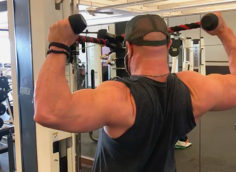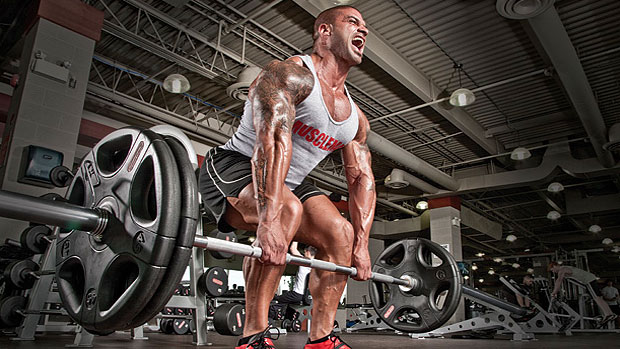I've had very narrow and unimpressive shoulders for a big part of my life. Call it genetics if you want; the fact is that my biacromial width was very small. Women would walk up to me and say, "You're cute, but your biacromial width just doesn't do it for me." Okay, they didn't really say that, but for my first years of training, despite putting on a significant amount of muscle, I always looked like a Neanderthal with narrow, rounded shoulders. It's a shame really, because the shoulder muscles can make or break your physique!
The delts are among the most important in the body yet many coaches recommend not training them directly. This is a big mistake! If anything, shoulder training should be the cornerstone of a good training program. I'll give you three reasons why:
- The shoulder joint is the most mobile in the body. As such, it's rather fragile and prone to injury. Strengthening the shoulder joint muscles is a sure way to reduce the risk of getting hurt.
- The male physique is often judged according to width. Wide shoulders and bowling ball deltoids spell athleticism, strength, and confidence.
- The shoulder muscles are synergists of many other muscles, so they can be a limiting factor in a lot of exercises.
So having strong shoulders is a required element for injury prevention, aestheticism, and performance. This begs the question: if shoulder development is so important, why don't all trainees have it?
The answer is rather simple: they don't know how to do it! I pride myself in being an expert on shoulder development. Since I have a naturally narrow shoulder structure, I've had to work extra hard to find ways of creating monster deltoids. Plus, my experience in Olympic lifting has taught me a lot of ways to build humongous shoulders.
Add the fact that many of my hockey players come up to me with a history of shoulder injury and you have a strong basis of knowledge on how to build strong and powerful shoulders!
This complete shoulder overhaul program is divided into two training blocks of four weeks each. The first is an accumulation block and the second is an intensification block. The difference between both phases will be marked and varied. The following table explains the differences:
| Phase of Training | Accumulation Block | Intensification Block |
|---|---|---|
| Duration | 8 sessions in 4 weeks | 4 sessions in 4 weeks |
| Frequency | 2 workouts per week | 1 workout per week |
| Intensity | Moderate | High |
| Volume | High | Low to moderate |
| Complexity of Movements | Simple motor movements | More complex motor movements |
The purpose of an accumulation block is to place the body under a large amount of physiological stress by including a lot of total mechanical work. This high volume/high frequency method can really lead to huge muscle gains provided that the individual rests enough.
Despite what many people believe, including phases of high volume training is necessary for everybody but beginners to stimulate maximum hypertrophy gains. That's not to say super high volume training should be done all year long though. More than four consecutive high volume weeks can be detrimental, leading to overuse, stagnation, and eventually overtraining.
But in the scope of this program, using a short, high volume phase will increase protein synthesis and get you structurally ready for the intensification block.
There are two shoulder workouts per week during the accumulation block. Ideally, you'll want to do them on the first and last training sessions of the week. A good split looks like this:
- Day 1: Shoulder Workout #1
- Day 2: Biceps/Triceps
- Day 3: OFF
- Day 4: Chest/Back
- Day 5: Legs/Abs
- Day 6: Shoulder Workout #2
- Day 7: OFF
A. Old-Style Military Press
The term "old-style" refers to the press technique used by Olympic weightlifters prior to the advent of what's known as "Russian press technique" (pressing while hyperextending the lower back, almost making it a standing bench press). An old-time press is done with only the arms being allowed to move. The legs, back and torso stay tight during the whole movement and the heels are stacked together. The bar starts on the clavicle and you press it overhead in one smooth motion.


| Parameter | Week 1 | Week 2 | Week 3 | Week 4 |
|---|---|---|---|---|
| Sets | 3 | 6 | 4 | 3 |
| Reps | 12 | 12 | 8 | 6 |
| Load | 12RM (60-75%) | 12RM (60-75%) | 8RM (70-85%) | 6RM (75-90%) |
| Tempo | 201 | 201 | 201 | 201 |
| Rest intervals | 1 min. | 1 min. | 90 sec. | 90 sec. |
B. One Arm Cable Lateral Raise

I really like this exercise to increase medial deltoid development, which will eventually widen your physique. I feel that doing this movement one arm at a time can really help you focus on getting a quality muscle contraction. To make this movement effective, you must pause for two seconds when the weight is lifted at shoulder height.
| Parameter | Week 1 | Week 2 | Week 3 | Week 4 |
|---|---|---|---|---|
| Sets | 3 | 6 | 4 | 3 |
| Reps | 15/arm | 15/arm | 10/arm | 8/arm |
| Load | 15RM (50-70%) | 15RM (50-70%) | 10RM (65-80%) | 8RM (70-85%) |
| Tempo | 121 | 121 | 121 | 121 |
| Rest intervals | 1 min. | 1 min. | 1 min. | 1 min. |
C. Lean Away Lateral Raise

Another superior deltoid exercise! Incline your trunk sideways by holding onto a fixed object and lateral away!
| Parameter | Week 1 | Week 2 | Week 3 | Week 4 |
|---|---|---|---|---|
| Sets | 3 | 6 | 4 | 3 |
| Reps | 15 | 15 | 10 | 8 |
| Load | 15RM (50-70%) | 15RM (50-70%) | 10RM (65-80%) | 8RM (70-85%) |
| Tempo | 121 | 121 | 121 | 121 |
| Rest intervals | 1 min. | 1 min. | 1 min. | 1 min. |
A. Snatch-Grip Behind the Neck Press

I know the behind the neck press has received a lot of bad press recently and I must admit that I don't like it either. However, I find the snatch grip (very wide grip) press to be safe and very effective at building huge deltoids! I used it myself extensively to solidify my receiving position in the snatch and really noticed a huge improvement in shoulder development from doing this exercise alone!
| Parameter | Week 1 | Week 2 | Week 3 | Week 4 |
|---|---|---|---|---|
| Sets | 3 | 6 | 4 | 3 |
| Reps | 12 | 12 | 8 | 6 |
| Load | 12RM (60-75%) | 12RM (60-75%) | 8RM (70-85%) | 6RM (75-90%) |
| Tempo | 201 | 201 | 201 | 201 |
| Rest intervals | 1 min. | 1 min. | 90 sec. | 90 sec. |
B. Power Upright Rowing

This is essentially a cheated upright row because you use your legs to start the weight. This will allow you to use more weight, which will really put a lot of stimulation on both the deltoids and traps. To make this exercise effective you must hold the completed position for two seconds while flexing your shoulders and traps really hard.
| Parameter | Week 1 | Week 2 | Week 3 | Week 4 |
|---|---|---|---|---|
| Sets | 3 | 6 | 4 | 3 |
| Reps | 12 | 12 | 8 | 6 |
| Load | 12RM (60-75%) | 12RM (60-75%) | 8RM (70-85%) | 6RM (75-90%) |
| Tempo | 121 | 121 | 121 | 121 |
| Rest intervals | 1 min. | 1 min. | 90 sec. | 90 sec. |
C. Incline Rear Delt Raises

You'll use rear delt raises to finish off the rear delts (which can add incredible depth to your physique). This is one of my favorite exercises to keep the shoulder muscles in balance.
| Parameter | Week 1 | Week 2 | Week 3 | Week 4 |
|---|---|---|---|---|
| Sets | 3 | 6 | 4 | 3 |
| Reps | 15 | 15 | 10 | 8 |
| Load | 15RM (50-70%) | 15RM (50-70%) | 10RM (65-80%) | 8RM (70-85%) |
| Tempo | 121 | 121 | 121 | 121 |
| Rest intervals | 1 min. | 1 min. | 1 min. | 1 min. |
After the four weeks of high volume/moderate intensity training, your shoulders will be begging for a change of stimulus. And we're going to give it to them!
The intensification phase will really make the difference between muscular shoulders and bowling ball deltoids. The training frequency will be reduced to one workout per week; this is to give your body the proper rest it'll need to grow after such a hellish workout! We're going to lift big weights in this phase of training and use more complex movements.
As I mentioned, there's only one shoulder workout per week during the intensification block. Ideally, you'll want to do them on the first session of the week. A good split looks like this:
- Day 1: Shoulder Workout
- Day 2: OFF
- Day 3: Biceps/Triceps
- Day 4: OFF
- Day 5: Chest/Back
- Day 6: Legs/Abs
- Day 7: OFF
A. Push Press

The push press is essentially a cheated military press. You use your legs to start the weight off of your shoulders, but the arms still do most of the work. This technique should allow you to use 25 to 45 pounds more than in the old-time military press, which will place a great stimulus on the deltoids. To facilitate leg drive, the feet are set apart (hip width).
| Parameter | Week 1 | Week 2 | Week 3 | Week 4 |
|---|---|---|---|---|
| Sets | 4 | 6 | 4 | 3 |
| Reps | 6 | 6 | 5 | 4 |
| Load | 6RM (75-90%) | 6RM (75-90%) | 5RM (80-92%) | 4RM (92-94%) |
| Tempo | Explosive | Explosive | Explosive | Explosive |
| Rest intervals | 2 min. | 2 min. | 2 min. | 2 min. |
B. Bent Press

This forgotten exercise is a formidable shoulder builder as it necessitates a constant contraction of all the shoulder muscles, either to lift the weight or stabilize it. While gung-ho individuals might take pleasure in doing this drill with a barbell, most should start with a dumbbell, at least until they get in the proper groove.
In French the bent press is called a d'viss', which more or less means unscrewing. This is because you basically screw yourself under the bar while you press the weight and bend under it. As an added benefit, the bent press will develop a very strong trunk.
| Parameter | Week 1 | Week 2 | Week 3 | Week 4 |
|---|---|---|---|---|
| Sets | 4 | 6 | 4 | 3 |
| Reps | 6/arm | 6/arm | 5/arm | 4/arm |
| Load | 6RM (75-90%) | 6RM (75-90%) | 5RM (80-92%) | 4RM (92-94%) |
| Tempo | Controlled | Controlled | Controlled | Controlled |
| Rest intervals | 2 min. | 2 min. | 2 min. | 2 min. |
C. Single Arm Old-Time Military Press

This movement is a variation of the old-time military press. You'll remember that the lifting motion in this style must be very strict, meaning that the whole body should stay tight and only the arm lift the load. Using a dumbbell, clean it to your shoulder and press it overhead in a straight line in one smooth motion.
| Parameter | Week 1 | Week 2 | Week 3 | Week 4 |
|---|---|---|---|---|
| Sets | 4 | 6 | 4 | 3 |
| Reps | 6/arm | 6/arm | 5/arm | 4/arm |
| Load | 6RM (75-90%) | 6RM (75-90%) | 5RM (80-92%) | 4RM (92-94%) |
| Tempo | 201 | 201 | 201 | 201 |
| Rest intervals | 90 sec. | 90 sec. | 90 sec. | 90 sec. |
D. Ahrens Press
Chuck Ahrens is relatively unknown to most modern trainees, but in his time he was considered to have the strongest shoulders and arms in the world. He was so wide he looked unreal!
In his prime, Ahrens could do reps with 200 pound dumbbells in the shoulder press (some people even claim to have seen him press a 300 pound dumbbell with one arm), perform 28 reps with 405 in the bench press, and perform a slow and controlled concentration curl with a 115 pound barbell.

One of his shoulder exercises was very peculiar: he'd do overhead dumbbell presses, but instead of pressing them straight up he'd press them up and away laterally (basically doing a "V" with both arms). He had no choice but to press in this matter because he used special loadable dumbbells that were very long; pressing them straight up was thus impossible without the bells hitting each other.
What this exercise does is place the shoulders, especially the medial portion of the deltoid, under greater tension as the movement gets completed.
| Parameter | Week 1 | Week 2 | Week 3 | Week 4 |
|---|---|---|---|---|
| Sets | 4 | 6 | 4 | 3 |
| Reps | 6 | 6 | 5 | 4 |
| Load | 6RM (75-90%) | 6RM (75-90%) | 5RM (80-92%) | 4RM (92-94%) |
| Tempo | 222 | 222 | 222 | 222 |
| Rest intervals | 90 sec. | 90 sec. | 90 sec. | 90 sec. |
Mr. and Ms. Beast know how to build strong shoulders!

You can build them too with this powerful eight-week program! It's a lot of work but it's worth it. Give it a go and you won't be disappointed by the results!




